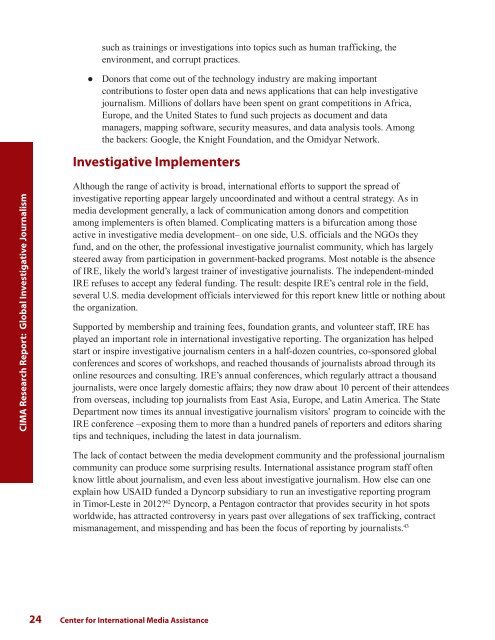CIMA-Investigative Journalism - Dave Kaplan
CIMA-Investigative Journalism - Dave Kaplan
CIMA-Investigative Journalism - Dave Kaplan
Create successful ePaper yourself
Turn your PDF publications into a flip-book with our unique Google optimized e-Paper software.
<strong>CIMA</strong> Research Report: Global <strong>Investigative</strong> <strong>Journalism</strong><br />
such as trainings or investigations into topics such as human trafficking, the<br />
environment, and corrupt practices.<br />
● Donors that come out of the technology industry are making important<br />
contributions to foster open data and news applications that can help investigative<br />
journalism. Millions of dollars have been spent on grant competitions in Africa,<br />
Europe, and the United States to fund such projects as document and data<br />
managers, mapping software, security measures, and data analysis tools. Among<br />
the backers: Google, the Knight Foundation, and the Omidyar Network.<br />
<strong>Investigative</strong> Implementers<br />
Although the range of activity is broad, international efforts to support the spread of<br />
investigative reporting appear largely uncoordinated and without a central strategy. As in<br />
media development generally, a lack of communication among donors and competition<br />
among implementers is often blamed. Complicating matters is a bifurcation among those<br />
active in investigative media development– on one side, U.S. officials and the NGOs they<br />
fund, and on the other, the professional investigative journalist community, which has largely<br />
steered away from participation in government-backed programs. Most notable is the absence<br />
of IRE, likely the world’s largest trainer of investigative journalists. The independent-minded<br />
IRE refuses to accept any federal funding. The result: despite IRE’s central role in the field,<br />
several U.S. media development officials interviewed for this report knew little or nothing about<br />
the organization.<br />
Supported by membership and training fees, foundation grants, and volunteer staff, IRE has<br />
played an important role in international investigative reporting. The organization has helped<br />
start or inspire investigative journalism centers in a half-dozen countries, co-sponsored global<br />
conferences and scores of workshops, and reached thousands of journalists abroad through its<br />
online resources and consulting. IRE’s annual conferences, which regularly attract a thousand<br />
journalists, were once largely domestic affairs; they now draw about 10 percent of their attendees<br />
from overseas, including top journalists from East Asia, Europe, and Latin America. The State<br />
Department now times its annual investigative journalism visitors’ program to coincide with the<br />
IRE conference –exposing them to more than a hundred panels of reporters and editors sharing<br />
tips and techniques, including the latest in data journalism.<br />
The lack of contact between the media development community and the professional journalism<br />
community can produce some surprising results. International assistance program staff often<br />
know little about journalism, and even less about investigative journalism. How else can one<br />
explain how USAID funded a Dyncorp subsidiary to run an investigative reporting program<br />
in Timor-Leste in 2012? 42 Dyncorp, a Pentagon contractor that provides security in hot spots<br />
worldwide, has attracted controversy in years past over allegations of sex trafficking, contract<br />
mismanagement, and misspending and has been the focus of reporting by journalists. 43<br />
24 Center for International Media Assistance


